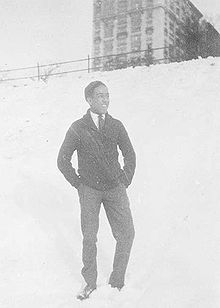- The Negro Speaks of Rivers
-
"The Negro Speaks of Rivers" is a poem by American writer Langston Hughes.
Contents
Composition and publication history
Langston Hughes wrote the poem on an envelope while traveling by train to Mexico as he crossed the Mississippi River to St. Louis. "The Negro Speaks of Rivers" was first published in The Crisis in June 1921, p. 17, the first of his poems printed in that journal.[1]:24 That same month, it also appeared in The Literary Digest.[1]:333 The poem was originally dedicated to W. E. B. Du Bois,[1]:319 though that dedication does not appear in later printings of the poem.
"The Negro Speaks of Rivers" was collected in Hughes's first book of poetry, The Weary Blues, in 1926.[citation needed] That book was published with the help and patronage of Carl Van Vechten,[2] who also supplied an introduction. Van Vechten was accused of influencing Hughes's poetry, which he denied. He claimed that the volume was complete before he ever met Hughes, though evidence shows that the two met earlier on November 24, 1924, with Countee Cullen.[3]:172
Twenty years after its publication, Hughes suggested the poem be turned into a Hollywood film but the project never went forward.[1]:305
Analysis
In his early writing, including "The Negro Speaks of Rivers", Hughes was inspired by American poet Carl Sandburg.[4] Like many of Hughes's other writings, the poem depicts an African-American who recognizes and reaffirms his connection to Africa and uses that African heritage as a source of pride.[3]:169
See also
- Confluence, an artwork by Robert Stackhouse and Carol Mickett inspired by the poem in the collection of the Indianapolis Art Center.
References
- ^ a b c d Berry, Faith (1992), Langston Hughes: Before and Beyond Harlem, New York: Citadel Press, ISBN 0806513071.
- ^ Wagner, Jean (1973), University of Illinois Press, p. 390, ISBN 0252003411.
- ^ a b Ikonné (1981), From DuBois to Van Vechten: The Early New Negro Literature, 1903–1926, Westport, CT: Greenwood Publishing, ISBN 031322496X.
- ^ Tracy, Steven Carl (2001), Langston Hughes and the Blues, University of Illinois Press, p. 142, ISBN 0252069854.
External links
- Shades of Black at the DuBois Learning Center
- On "The Negro Speaks of Rivers" at Modern American Poetry

This article related to a poem is a stub. You can help Wikipedia by expanding it.

